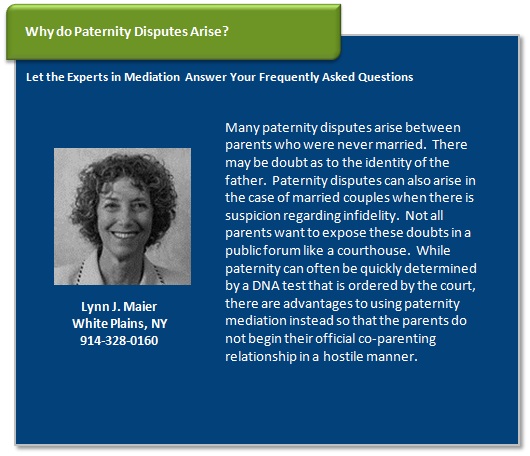
Mediating Paternity Cases: Only the Beginning
In many states, it is necessary for a father to first establish paternity before he will have any rights to the child. This makes the paternity action the first of potentially many issues to be decided. By mediating the paternity case rather than litigating it, the parties can begin in a spirit of cooperation and work toward making other decisions related to the child.
In mediation, the parties can discuss their respective positions in a calm and respectful manner. At the same time, parents can use creative solutions that may not be available in court. For example, if a man knows that he is not the biological father but would like to remain part of the child’s life, the parents may agree to paternity without requiring any type of DNA test to confirm parentage. If the parties do not wish to have their case made public in front of others in the courtroom, mediation is a sensible alternative as the information shared during mediation is confidential.
After paternity is established, the parents may then discuss other topics related to the child, including their goals for his or her upbringing, the type of relationship that the parents want the child to have with each of them and how much time each parent will have with the child. The parents may find that they are in agreement on many of these subjects once they focus on the child’s interests. The parents may work out a parenting plan, custody arrangement or visitation schedule that suits both the needs of their child and their own professional and personal obligations.
Parents can also discuss child support by taking into consideration their incomes, the costs of daycare, medical insurance and other costs to raise the child.
How to Check Online Reviews
May 15, 2017
How to prioritize your post-graduation debt – Flowers are blooming, birds are singing and graduation caps are flying. Each spring, 3.5 million U.S. young people graduate from high school. Nearly 3 million more receive an associate’s or bachelor’s degree.
Top 10 Real Estate Influencers to Follow – The cut-throat world of real estate can be particularly unforgiving to new entrepreneurs. However, the payoff can be huge. Whether you want to become a top broker or develop an empire of investment properties of your own, it helps to take lessons from those who have already done it.
Healthcare Job Growth Slows in 2017 – Healthcare job creation remains strong in 2017, but the sector is no longer matching last year’s explosive growth, new data from the Bureau of Labor Statistics show.
May 12, 2017
Mortgage rates edge up as politics and economics muddle financial markets – Home loan rates don’t move as dramatically as Treasury yields do
What Is a HomePath Property? A Foreclosure With Surprising Advantages – Until the housing bubble burst in 2008, the Federal National Mortgage Association, aka Fannie Mae, had one main job: to keep mortgage money flowing to help Americans fulfill their dreams of homeownership.
You Have More Credit Card Debt Than Emergency Savings – Your pile of credit card debt is outgrowing the emergency fund that’s your last hope of paying it off.
Lynn J. Maier
Mediating Palimony Claims
Palimony is a mix between the word “pal” and “alimony” for good reason. Alimony is commonly reserved for married couples. However, in some cases, it – or something like it – may be awarded to individuals who are not married. Being involved in a legal battle in which palimony is contemplated can be complex and exhausting.
When a couple gets divorced, the law in their state uses equitable distribution or community property principles, depending on state law. However, when they are determining palimony, they often apply theories related to contract law or equity considerations. In this manner, cohabitating couples are afforded some protections, although these are often much less than those afforded married partners.
Litigating palimony cases is often time-consuming and expensive. A party who does not want to pay palimony may wind up fighting over the issue and being ordered to pay anyway. A party who does want alimony may wind up spending a sizable amount of money on litigation only to find out that he or she does not meet the state requirements for palimony. Just like in alimony cases, the judge is often given a significant amount of discretion, so the outcome is often unpredictable. Additionally, palimony laws vary by each state with some requiring a formal written contract before awarding it, so it is difficult to determine whether a person may be eligible for this type of support.
Rather than litigating the claim, many parties may benefit from mediating it. During mediation, the parties can present their own position and work toward a compromise. The parties may agree for the higher-earning partner to pay for education or temporary support based on promises that were made during the relationship. By engaging in the mediation process, parties can often maximize the satisfaction of their needs while minimizing a risky outcome.





